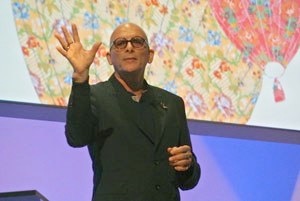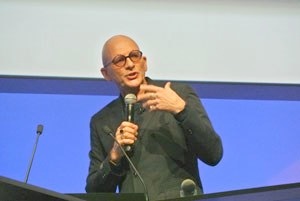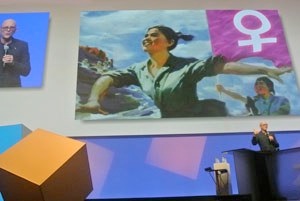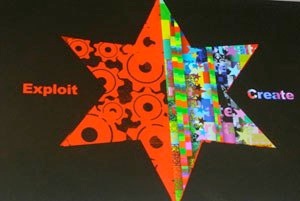TFWA 2012 Opening Conference
We must embrace today's technology
A packed auditorium at the Palais des Festivals in Cannes greeted the high profile speakers at the opening Conference of TFWA World Exhibition on Monday 22nd October on the theme ‘A Brand New Dimension’.
Wearing special 3D spectacles, a capacity crowd heard TFWA President Erik Juul-Mortensen sum up the current state of the global duty free and travel retail industry accompanied by a three-dimensional visual presentation, which in itself illustrated how available technology can be employed to great effect. Quoting 2011 statistics from industry analyst Generation Research, including global travel retail sales totaling US$46 billion, he said that having traded through a sustained period of grave financial and economic instability, the industry’s good results last year could be described as “a performance to be proud of”. He noted that Asia outperformed Europe for the first time and commented that “the whole industry should be grateful to the Asia Pacific region, the engine that pulled the global duty free and travel retail industry forward.”
He addressed three factors which will be major influences on this industry: the new profile of customers and the increasing importance of the Asian consumer; the endlessly uncertain global economy; and the ever-increasing pace of technology development. Describing the new generation of travellers as “sophisticated and heavy-users of online retail and social media”, Juul-Mortensen said: “for the immediate future we will have to continue relying on Chinese, Russian, Brazilian and key Middle East passengers to generate our best sales growth.” He then ephasized the benefits of today’s technology in the travel and shopping environment: "we must embrace the technology that will keep us connected in what is increasingly a totally interconnected world.”
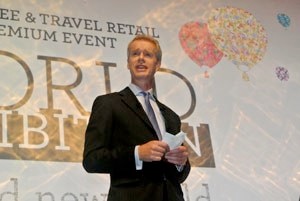


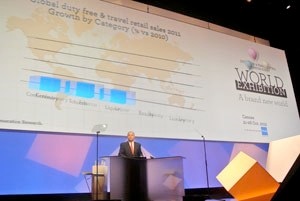

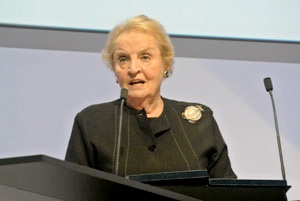
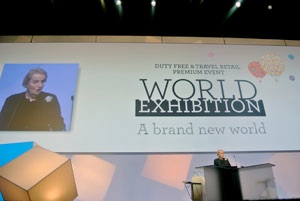
I am travel retail’s perfect customer !
Dr Madeleine Albright, former U.S. Secretary of State and Chair, Albright Stonebridge Group confessed that she was travel retail’s perfect customer: “I am in airports all the time and I really like shopping”. Drawing on her considerable experience as a diplomat and politician, interspersed with amusing anecdotes, she provided an erudite summary of the current geopolitical situation. She said that there has always been a trend towards globalisation but it is the pace at which change happens now that has increased. She pointed to four realities: the growth of some economies – China, Brazil, Russia, Turkey – which has changed their economic leverage; new technology which has fuelled political change with four governments overthrown in the Middle East and a fifth under intense siege; the evolution of security threats which are even more threatening than before; religion which is a source of support to millions but whose doctrines can cause conflict. “Although we cannot underestimate these problems,” she said “we cannot be panicked by them either” She concluded that if she were asked whether she was an optimist or a pessimist she would say that “I am an optimist who worries a lot.”
Asked by moderator Stephen Sackur, Presenter BBC ‘Hardtalk’, whether the Chinese economic model is sustainable, she acknowledged that “the US’s relationship with China is the most important strategic relationship”. She anticipated that the consuming middle class there ultimately will want to influence the political system which will bring about change. However she said she does not ‘buy’ the decline of the US – “We are not in a bi-polar or uni-polar world – it is multi-polar”. She urged the duty free and travel retail business not to overlook Africa which she said was demographically perfect for development with a young cohort of consumers, many highly educated in the west and elsewhere, who embrace technology and who are already using mobile phones for money transactions.

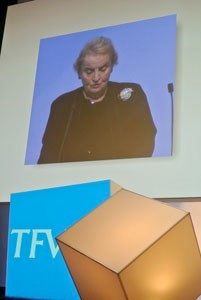
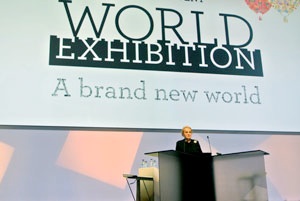

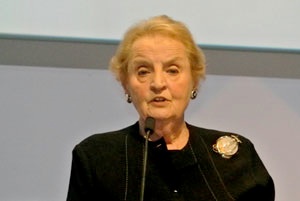
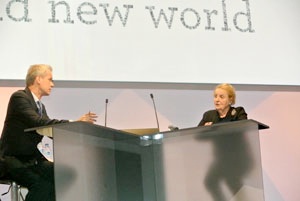
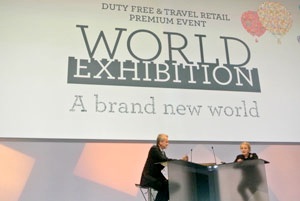

The Airport Experience: the New Frontier
Jean-Charles Decaux, Chairman of the Executive Board and Co-CEO, JCDecaux focused on ‘The Airport Experience: The New Frontier’. He said that brands and the advertising industry need to adapt to a rapidly changing world. There are already 2.3bn mobile phone users and 80% of US and 60% of European citizens are connected to the internet. Passengers have permanent access to information which means that they change their minds about their purchases right up until the last minute. “The frontiers between offline and online shopping are becoming blurred,” he said. Traditional shops are becoming connected and virtual retailers are opening physical stores in order to provide better customer service. The world of media is becoming fragmented – TV, radio, internet, mobile phones, social networks – and the new generation of consumers are accustomed to multi-tasking, using several media at once. Thus brands need to understand much more complex media, he cautioned. Quoting from research conducted by his company into consumer behaviour at airports around the world he said that interaction with brands is key to the customer experience at airports. 75% of travellers questioned enjoy looking at the shops, exhibits and advertisements while travelling; 82% want more entertainments and services like charging stations and live sports updates; 86% think the airport is a good place to experiment with brands. He concluded that the changing world offers new opportunities for creating the ‘Airportainment Experience’ where the passenger can enjoy the virtual and the real.





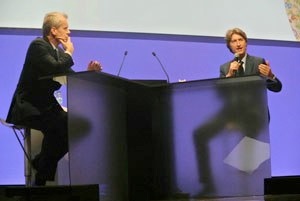
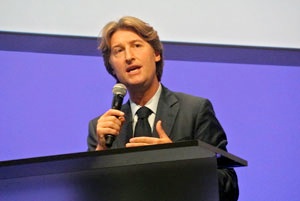

Two forces are at work: globalisation and technology
Finally, Kjell A. Nordstrom, economist and author, opened his presentation with the statement that all nations with the exception of North Korea are capitalist and that this change has taken place in just 35 years. Two forces are at work: globalisation and technology. “I cannot think of any human activity that is not affected by these two transforming factors.” He gave the example of low cost carriers – “do it yourself travel” – that rely on the latest technology. Technology is another name for knowledge, he said, packaged knowledge and it is growing exponentially. “Firms can’t close the gap between knowledge and information on their own because it is too complex.” He likened this development of information technology to the invention of the printing machine; “for the first time it was possible to separate the idea from its creator”. It will change every human relationship, he said. In his wide ranging presentation he also highlighted how society is changing. Significantly more women than men are being educated at university which means there will be more women in high level jobs. Women have a different approach to risk so this will impact business behaviour. There is also a trend towards single households so society is moving away from the traditional concept of the family. And currently 52% of the world’s population lives in cities and by 2035 this figure is expected to rise to 80%. Even the concept of a company is redefined, according to Nordstrom. It used to be a small creative element and a large exploitation machine; now business needs to be equally “creation” and “exploitation”. Citing the examples of IKEA and, iPhone and Lady Gaga he said that business is about the creation of a temporary monopoly which has three possible directions to follow: survival of the fittest, constant attractiveness, and continued creativity.

